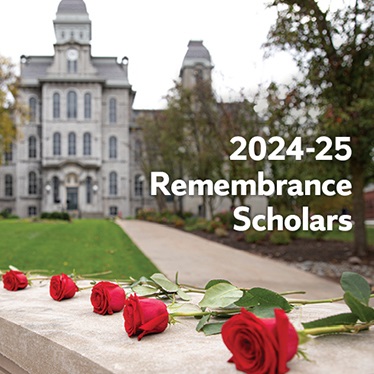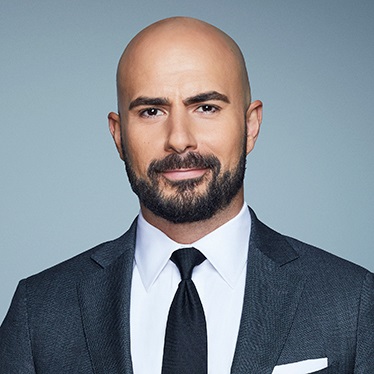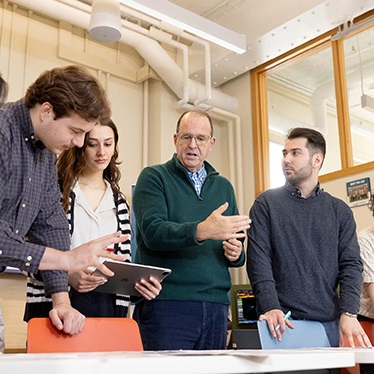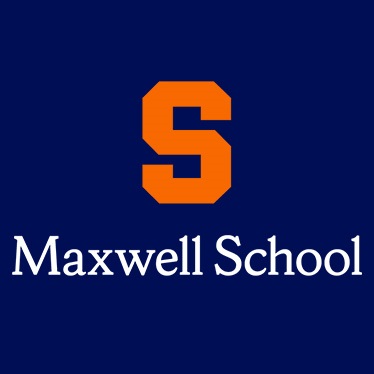Action Plans
June 1, 2016
As a senior at Maxwell, Hermela Dereje helped to recover hundreds of pounds of untouched, garbage-bound food each day from University dining halls and then to distribute it to the Syracuse community. And she did this as part of her major in Citizenship and Civic Engagement (CCE), which gears interdisciplinary citizenship education toward real-world outcomes in social activism, public affairs, and politics.
The seed of Dereje’s food recovery project was planted while she was working, through a community placement for her CCE major, with resettled refugees who often invited her to visit their homes. “I would go and share a meal with them,” says Dereje, who was born in Ethiopia and raised in Atlanta. “I saw a lot of poverty in those neighborhoods, and it was certainly a food desert.”
Through her CCE research seminar, Dereje investigated food waste and hunger issues. Then, for her senior project, she designed what is known in CCE as an Action Plan — in her case, a plan to work with the SU/ESF chapter of the Food Recovery Network to expand the amount of food recovered from campus dining halls each day and donated through local nonprofits.
This May, Dereje and 20 other seniors became CCE’s first graduating class. In its first three years, CCE has proven remarkably popular, with more students applying each year. (No more than 30 are accepted each year. By next fall, CCE will have achieved its total targeted enrollment of just more than 100 students.)
Each CCE student also has a home major, typically in the social sciences or public communications. (Dereje is in international relations.) They combine their home major with the interdisciplinary, citizenship-oriented, service-learning curriculum of CCE.
The program builds on Maxwell’s signature, team-taught MAX Courses, where the lessons of citizenship are explored while reflecting on current public issues. CCE majors also take courses on social-science methodology; work with community organizations; and study ethics, justice, and civic action. Out of this grows research on a selected social/political issue and a resulting Action Plan. Channeling civic engagement into real impact is the ultimate point.
The graduating class’s Action Plans attest to the power of interlacing citizenship education and pragmatic engagement. Sharon Kang, for example, whose home major is policy studies, also worked with local refugees, and pinpointed English language skills as a barrier to economic advancement. She designed a program linking refugee students and Syracuse University students taking upper-division Arabic.
IR major Adriana Curto was inspired by politically targeted spray-paint art she’d seen in documentaries about Palestinian refugee camps and, she says, by “the way people can express themselves through art in difficult times.” So she created an art therapy program in Syracuse for the children of refugee families, exploring ideas of home.
Alex Lynch, majoring in political science, researched off-campus crime and wrote an Action Plan to install security cameras in problem areas. His proposal has support among city and University officials. He plans to remain in Syracuse after graduation to work with SU’s Department of Public Safety to implement it.
“We get to take whatever our other major is and add onto it and apply it,” says Lynch. “We’re not just sitting in a classroom. We’re interning or working and actually being involved.”
In a program that works to build internal community — thanks to small classes, frequent social events, and in-depth advising — a profile of the classic CCE student has emerged, according to program coordinator Kate Canada. (The program also has a faculty chair; geography professor Anne Mosher was recently named to it.) “Students in CCE have diverse majors, interests, and backgrounds, but they all share a deep commitment to change,” says Canada. “They want to leave Syracuse University as engaged citizens of the world. Whether working in the field, in the boardroom, or in government, they want to make the world better.
“I’m undoubtedly biased,” Canada adds, “but I think these undergraduates are the very best Maxwell has to offer. I can’t wait to see what they accomplish as alumni!”
Related News
School News

Apr 18, 2024
School News

Apr 18, 2024
School News

Apr 17, 2024
School News

Apr 16, 2024